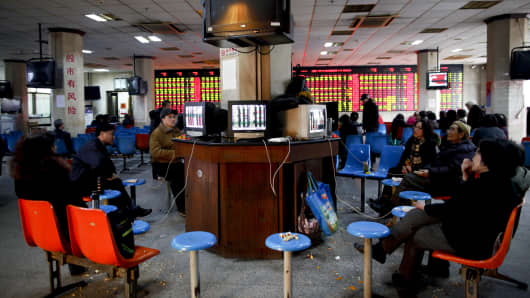The program will allow foreign investors to place buy or sell orders on Shanghai's A-share market through brokers in Hong Kong.
Asia-Pacific News
China’s stock market cracks open
The Shanghai-Hong Kong stock connect got under way on
Monday, in a sea change that will crack open China's A-share markets to
foreign investment, potentially breaking the market out of a long
downturn.
The program will allow foreign investors to place buy or sell orders on Shanghai's A-share market through brokers in Hong Kong. Chinese investors meanwhile will be able to use mainland brokers to invest in Hong Kong's H-share market.
The Shanghai Composite initially opened higher, rising as high as 2508, before slipping into negative territory. The index is down around 25 percent over the past five years and still well off its peak of just over 6000 in late 2007.
Hong Kong stocks also rose at the start of Monday's session before reversing gains to trade 0.6 percent lower.
"This is the beginning of the end of China's capital controls. This is a big step toward integrating capital markets between mainland China and Hong Kong," Steven Sun, head of China equity strategy at HSBC, told CNBC. "It's going to lead to one country, one market."
Since 2003, selected major institutions have had access to A-shares under China's "Qualified Foreign Institutional Investor" program (QFII), but Stock Connect will open about 90 percent of Shanghai's total market capitalization to global investors.
"Stock connect facilitates the gradual opening of the mainland capital account and the internationalization of the renminbi as an investment currency for global investors," CY Leung,chief executive of the Hong Kong special administrative region, said in an address at the Hong Kong Stock Exchange.
The program will allow foreign investors to place buy or sell orders on Shanghai's A-share market through brokers in Hong Kong. Chinese investors meanwhile will be able to use mainland brokers to invest in Hong Kong's H-share market.
The Shanghai Composite initially opened higher, rising as high as 2508, before slipping into negative territory. The index is down around 25 percent over the past five years and still well off its peak of just over 6000 in late 2007.
Hong Kong stocks also rose at the start of Monday's session before reversing gains to trade 0.6 percent lower.
"This is the beginning of the end of China's capital controls. This is a big step toward integrating capital markets between mainland China and Hong Kong," Steven Sun, head of China equity strategy at HSBC, told CNBC. "It's going to lead to one country, one market."
Since 2003, selected major institutions have had access to A-shares under China's "Qualified Foreign Institutional Investor" program (QFII), but Stock Connect will open about 90 percent of Shanghai's total market capitalization to global investors.
"Stock connect facilitates the gradual opening of the mainland capital account and the internationalization of the renminbi as an investment currency for global investors," CY Leung,chief executive of the Hong Kong special administrative region, said in an address at the Hong Kong Stock Exchange.
Market boost?
But it's not clear stock gains will come immediately. There is a daily limit of $3.8 billion in cross-flow purchases -- with Hong Kong investors limited to 13 billion yuan ($2.1 billion) daily in A-share trades. The total limit comes to only about 20 percent of combined trading volume for the two exchanges currently.
In first 15 minutes of trade Monday, more than 50 percent of the north-bound quota was already filled, according to Thomson Reuters data.
"Given all the daily trading quotas and so on, in the early stages it's probably going to be taken up fairly quickly," Helen Zhu, head of China equities at Blackrock, told CNBC.
Others also expect a limited initial impact on A-shares.
"The success of this program should be measured in years rather than days and weeks," Sun said. HSBC expects the Shanghai index will rise only to 2500 by year-end, and 2800 by the end of next year.
To be sure, there have been plenty of excitement ahead of the launch, which investors expect will bring many benefits.
"This is going to significantly change the institutional investors' participation in the domestic A-share market and hopefully [will] force improvement of better corporate governance," Sun said. "Over the long term, the fundamental-driven value investment style will be instilled in the domestic A-share market."
Zhu also expects a longer term change in how investors view and trade mainland-listed shares.
"It's a catalyst," Zhu said. "With the stock connect, people are starting to think about how investors might be more fundamental and some of the undervalued blue chips that are in the index might start to move up.
But it's not clear stock gains will come immediately. There is a daily limit of $3.8 billion in cross-flow purchases -- with Hong Kong investors limited to 13 billion yuan ($2.1 billion) daily in A-share trades. The total limit comes to only about 20 percent of combined trading volume for the two exchanges currently.
In first 15 minutes of trade Monday, more than 50 percent of the north-bound quota was already filled, according to Thomson Reuters data.
"Given all the daily trading quotas and so on, in the early stages it's probably going to be taken up fairly quickly," Helen Zhu, head of China equities at Blackrock, told CNBC.
Others also expect a limited initial impact on A-shares.
"The success of this program should be measured in years rather than days and weeks," Sun said. HSBC expects the Shanghai index will rise only to 2500 by year-end, and 2800 by the end of next year.
To be sure, there have been plenty of excitement ahead of the launch, which investors expect will bring many benefits.
"This is going to significantly change the institutional investors' participation in the domestic A-share market and hopefully [will] force improvement of better corporate governance," Sun said. "Over the long term, the fundamental-driven value investment style will be instilled in the domestic A-share market."
Zhu also expects a longer term change in how investors view and trade mainland-listed shares.
"It's a catalyst," Zhu said. "With the stock connect, people are starting to think about how investors might be more fundamental and some of the undervalued blue chips that are in the index might start to move up.












0 σχόλια:
Δημοσίευση σχολίου
Ο σχολιασμός επιτρέπεται μόνο σε εγγεγραμμένους χρήστες